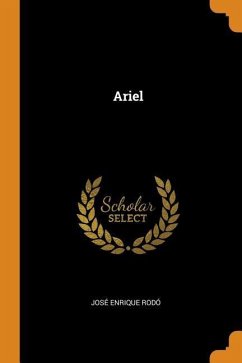Produktdetails
- Verlag: FRANKLIN CLASSICS TRADE PR
- Seitenzahl: 178
- Erscheinungstermin: 20. Oktober 2018
- Englisch
- Abmessung: 230mm x 143mm x 12mm
- Gewicht: 268g
- ISBN-13: 9780343855406
- ISBN-10: 0343855402
- Artikelnr.: 58190551
Hinweis: Dieser Artikel kann nur an eine deutsche Lieferadresse ausgeliefert werden.
- Libri GmbH
- Europaallee 1
- 36244 Bad Hersfeld
- 06621 890
José Enrique Rodó (1871-1917) was a Uruguayan philosopher, educator, and essayist. Born and raised in Montevideo, Rodó was a major figure of the modernismo literary movement. In 1898, he was appointed professor of literature at the University of the Republic. Additionally, Rodó served as the director of the National Library of Uruguay and as a member of the Chamber of Deputies. Through his correspondence with Leopoldo Alas of Spain, José de la Riva-Agüero of Peru, and Rubén Darío of Nicaragua, Rodó became the leading theorist of modernista literature, which sought to unite classical values and contemporary culture through a devotion to beauty and form. His major contribution to Latin American literature was Ariel (1900), an influential essay inspired by characters from Shakespeare's The Tempest. The essay is structured as a lecture by Prospero on authors from throughout European history. Ariel and Caliban, respectively the positive and negative aspects of human nature, represent the opposing forces of good and evil, the beautiful and the utilitarian in everyday life. Throughout his career, Rodó criticized the process of nordomanía, a term he used to describe the growing influence of North American values on Latin American culture.
Foreword by James W. Symington
Prologue by Carlos Fuentes
Ariel
Reader's Reference
Annotated Bibliography
Index
Foreword by James W. Symington
Prologue by Carlos Fuentes
Ariel
Reader's Reference
Annotated Bibliography
Index

